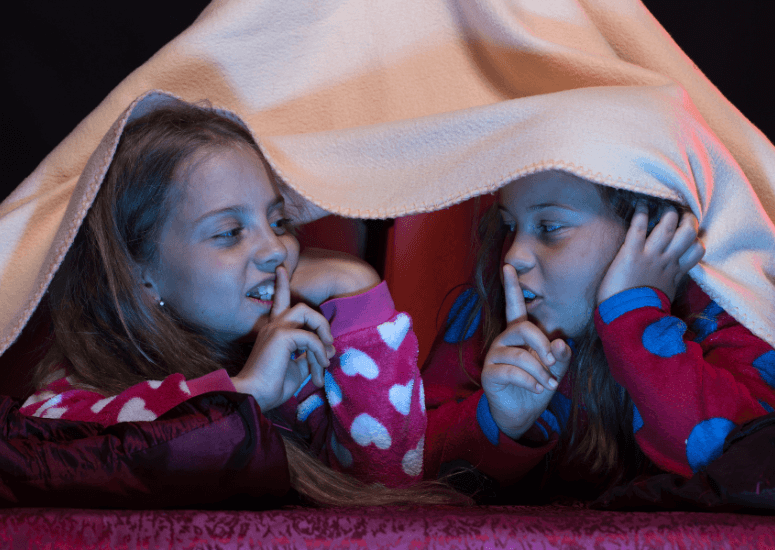When is it a good time to allow your kids to go on a sleepover?
As kids grow up and make friends, there will be times when they will ask to have a sleepover at someone else’s house.
For parents, letting them have one is a big decision to make. While staying the night with friends may appear harmless, there's a chance that kids could be exposed to danger. This was the horrifying experience of a 12-year-old girl from Oregon in the U.S. when her friend’s dad allegedly drugged their drinks during a sleepover.
According to a report by People, the incident happened in August 2023 wherein three 12-year-old girls were rushed to the hospital after they ingested a smoothie unknowingly spiked with benzodiazepine. The said drug is used to relieve anxiety, help with insomnia, and treat muscle spasms as it produces sedation and hypnosis, as per the Cleveland Clinic.
The girls were able to escape a worse situation as one of them managed to send her parents frantic texts at around 2 a.m., saying that she didn’t feel safe.
“Mom please pick me up and say I had a family emergency,” the girl’s text read, as stated in the affidavit.
“I don't feel safe. I might not respond but please come get me (crying emoji), Please. Please pick up. Please. PLEASE!!" she added.
The 57-year-old accused Michael Meyden turned himself in to the authorities on Feb. 28 and was indicted the next day on three counts each of causing another to ingest a controlled substance, application of a schedule-4 controlled substance to another, and delivery of a controlled substance to a minor.
When should a parent allow sleepovers?
Beng Feliciano, co-founder of online platform and social enterprise The Parenting Emporium, told PhilSTAR L!fe that deciding on sleepovers should depend on the child's level of independence, maturity, and ability to "articulate things that happen."
She added that it can be "tricky," as you have to consider the hosting family's "lifestyle and values, neighborhood, environment, household members as well as children’s temperaments."
This was seconded by Dr. Angelo Subida, a psychotherapist and life coach specializing in counseling for individuals and families, noting that parents should also assess the child's "ability to communicate their needs and feelings."
"Parents should also assess the trustworthiness of the hosting family and the level of supervision provided during the sleepover to ensure the child's safety and well-being," Dr. Subida shared to L!fe.
Sleepovers are a way for teens to bond more with their friends outside the school, but if you are torn on whether to allow them or not with concerns for their safety, you can take some preventive measures to assess the situation thoroughly.
Things to consider before letting a child go to a sleepover

According to Dr. Subida, try to establish open communication with the hosting parents.
"Ask about the details of the sleepover, including who will be present, the planned activities, sleeping arrangements, and any house rules," Subida told Life, adding that parents should also know more about "potential safety concerns" or their own restrictions, like if there will be an alcohol present.
He added that these questions will also help to know more and ensure that "the hosting parents share your values and expectations regarding the sleepover."
As per Feliciano, you can also ask about who the adults are in the household and if they will be there to supervise the kids for the whole night, and who else will join the sleepover. She added that these may vary, depending on how well a parent knows the hosting family.
Meanwhile, parents of both parties should also have clear guidelines and limitations for the sleepover. For Dr. Subida, these can be about "appropriate behavior, use of technology, access to certain areas of the house, and adherence to household rules."
He added that the hosting family should also know if there are any dietary restrictions and/or medical needs that must be considered for the child's safety and well-being.
Additionally, basic courtesy must also be observed, such as greeting the host family, and cleaning up after the night's activities, Feliciano said.
Red flags to watch out for

As you get to know the hosting family, it is vital to be vigilant on the red flags, especially if you don't know anything much about the household. Feliciano shared with L!fe that one way to get to know the household is to have a day visit.
"Being familiar with the home and all those living there can already be a springboard for decisions. If there was any discomfort felt during the day’s visit, one should think twice about a sleepover," she added.
For Dr. Subida, other things that must be considered as well are changes in the kid's behavior before and after the event.
"[His/her] reluctance to attend future sleepovers or [any] unexplained injuries," he said, adding that parents should also "Pay attention to any reports of inappropriate behavior or boundary violations from [their] child."
He added that parents should also consider feedback from other parents whose kids have gone to a sleepover at the same household.
How to say 'No'
In case all the red flags have been raised, don't hesitate to say no as it concerns the child's safety. According to Dr. Feliciano, parents can have an "open and honest" conversation with their children to better communicate their reasons for declining.
"Validate their feelings and offer alternative ways for them to socialize with their friends, such as hosting a sleepover at your own home or organizing a group outing," he added.
Otherwise, you can make arrangements instead. For Feliciano, parents may consider allowing their child to join the night's activities and pick them up afterward.
Other things to do to keep your child safe
Entrusting your child to a different household even for just a night is somehow scary, but if done right, it can be a memorable moment in their teenage life. This is why it is important for parents and children should build a strong rapport and maintain communication during the activities.
Here are some things you can teach your child to become independent and mature when dealing with other people, as advised by Dr. Subida:
- Encourage your child to trust their instincts and speak up if they feel uncomfortable or unsafe during a sleepover.
- Teach your child about personal boundaries, consent, and how to assert themselves in social situations.
- Stay connected with your child during the sleepover by checking in periodically and ensuring that they have a way to contact you if needed.
- Consider hosting a meet-and-greet with the hosting family before the sleepover to build rapport and address any concerns.
- Foster a supportive and open relationship with your child so they feel comfortable discussing their experiences and concerns with you.
"By prioritizing communication, safety, and trust, parents can help ensure that sleepovers are positive and enriching experiences for their children," he stressed. (With reports from Brooke Villanueva)


